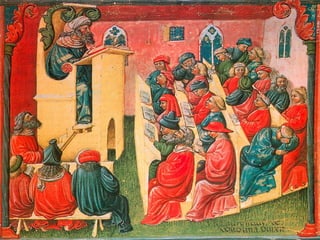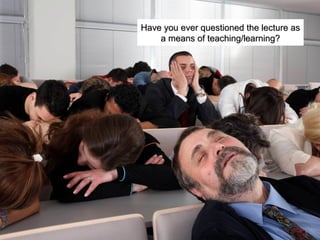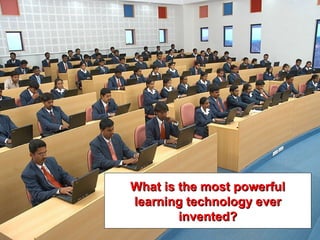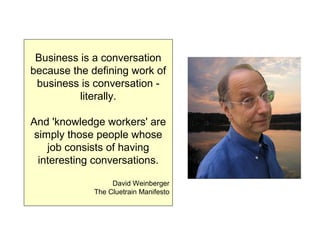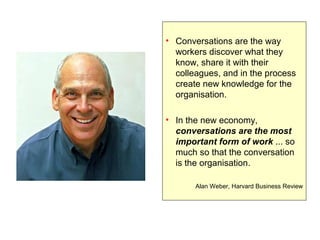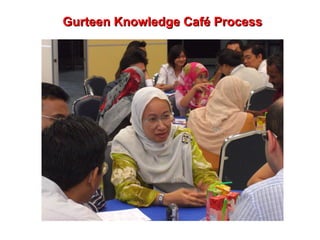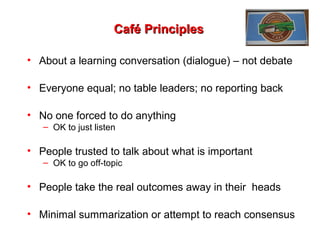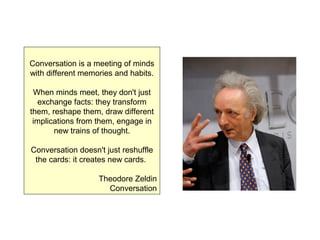Knowledge Cafe David Gurteen at KHDA, Dubai, 2013
- 1. Gurteen Knowledge Cafe KHDA Dubai 29 October 2013
- 3. Henry of Germany giving a lecture at the University of Bologna in the 14th century
- 4. Have you ever questioned the lecture as a means of teaching/learning?
- 5. Show me a Professor of Education … who lectures, and I’ll show you a hypocrite who doesn’t read the research. Donald Clarke, PlanB Learning
- 6. What is the most powerful learning technology ever invented?
- 7. Conversation is the most powerful learning technology ever invented Conversations carry news, create meaning, foster cooperation, and spark innovation. Encouraging open, honest conversation through work space design, setting ground rules for conversing productively, and baking conversation into the corporate culture spreads intellectual capital, improves cooperation, and strengthens personal relationships. Jay Cross, Informal Learning
- 8. What’s the defining work of business? What’s your job as a knowledge worker? What’s the most important form of work?
- 9. Business is a conversation because the defining work of business is conversation literally. And 'knowledge workers' are simply those people whose job consists of having interesting conversations. David Weinberger The Cluetrain Manifesto
- 10. • Conversations are the way workers discover what they know, share it with their colleagues, and in the process create new knowledge for the organisation. • In the new economy, conversations are the most important form of work ... so much so that the conversation is the organisation. Alan Weber, Harvard Business Review
- 11. Our most effective KM tool is conversation The words we choose, the questions we ask, and the metaphors we use to explain ourselves are what determine our success in creating new knowledge as well as sharing that knowledge with each other. Nancy Dixon Common Knowledge
- 12. What makes a good conversation?
- 13. The kind of conversation I’m interested in is one in which you start with a willingness to emerge a slightly different person. Theodore Zeldin Conversation Theodore is an Oxford Historian
- 14. Gurteen Knowledge Cafe London, September 2002
- 15. Global Knowledge Cafés • I have run them all over the world • Some interesting cultural experiences • Format always works • People love to talk • Discovered their power
- 16. Gurteen Knowledge Café Process
- 17. Basic Café Process • Speaker makes short presentation • Poses a trigger question • Small group conversations at tables • Three rounds of conversation • Whole group conversation (circle) • Share actionable insights Process can be adapted depending on the purpose of the Café, context, numbers, venue etc
- 18. Café Principles • About a learning conversation (dialogue) – not debate • Everyone equal; no table leaders; no reporting back • No one forced to do anything – OK to just listen • People trusted to talk about what is important – OK to go off-topic • People take the real outcomes away in their heads • Minimal summarization or attempt to reach consensus
- 19. Café Outcomes • Outcomes are what you take away in your head • Deeper understanding of the issues discussed • Deeper insight into other people’s perspectives • Better appreciation of your own point of view • Improved relationships • Position to make more informed decisions
- 20. What do you make of the Knowledge Café?
- 22. Surfacing Issues
- 23. ISN Zurich • Dramatic improvement in inter-team dialog, collaboration & knowledge sharing • Many internal work processes overhauled as a result • Explosion of new ideas & initiatives on the part of staff at all levels of the organization • Empowered staff to speak up and take the initiative Chris Pallaris Chief Editor, ISN, Zurich
- 25. Transform Decision Making Meetings • Break meetings into two parts • To better understand the issues – Dialogue - Café style – Divergent – Understanding • To make decisions and plans – Debate – Convergent – Making a decision
- 27. Transform any Talk • Move from – presentation + Q&A – 30 mins + 10 mins • to – presentation + reflection + conversation + Q&A • Allow – – – – 20 mins presentation 2 mins for reflection 10 mins for conversation 8 mins for Q&A KM UK KM Australia KM Singapore ECU Forum Mumbai + Johannesburg
- 28. Many Other Café Applications • • • • • • • • • • • • • • • learn from each other clarify issues gain insight break down organisational silos break down inter-personal barriers surface issues & problems surface potential risks surface opportunities get buy-in for a course of action stimulate innovation build better relationships engage with our work share good practice develop our unique voice move to action
- 29. What applications can you see for the Knowledge Café?
- 31. What can we each do individually to encourage more knowledge sharing in our organization?
- 32. How might we initiate more conversations in our organization and what would be the benefits?
- 33. www.gurteen.com David GURTEEN Gurteen Knowledge Fleet, United Kingdom Tel: +44 7774 178 650 Email: david.gurteen@gurteen.com
- 34. Licence • You may use these slides under the following Creative Commons Licence • Attribution-Share Alike 2.0 • http://creativecommons.org/licenses/by-sa/2.0/uk/
- 35. Some slides I did not use
- 36. Conversation is a meeting of minds with different memories and habits. When minds meet, they don't just exchange facts: they transform them, reshape them, draw different implications from them, engage in new trains of thought. Conversation doesn't just reshuffle the cards: it creates new cards. Theodore Zeldin Conversation
- 37. For all our knowledge, we have no idea what we're talking about. We don't understand what's going on in our business, our market, and our world. KM shouldn’t be about helping us to know more. It should be about helping us to understand. So, how do we understand things? It's through stories that we understand how the world works. David Weinberger The Cluetrain Manifesto


